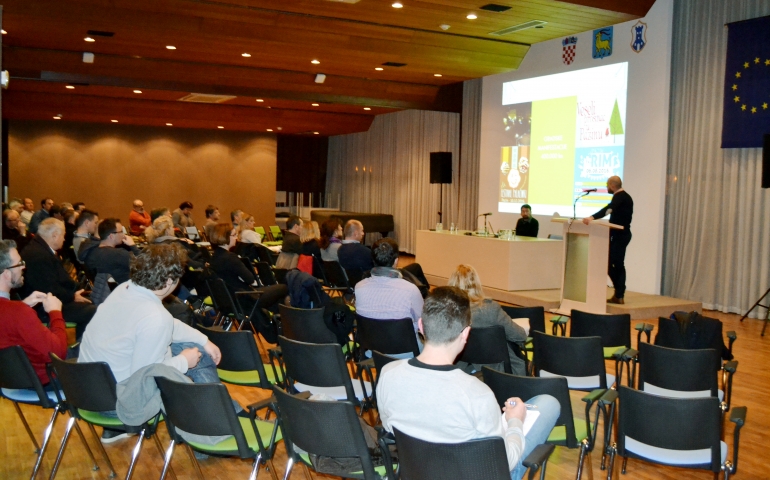Contact
The City of Pazin (HR) has been actively involving citizens in the process of adopting the city budget since 2014. This town of around 8 600 inhabitants experienced frustration and mistrust when the small municipal budget couldn't meet all expectations. Now citizens send proposals of communal actions which should be carried out the following year. After analysis by city officials, public hearings are held in each district. Citizens vote on how the allocated budget should be spent. In three years, 370 proposals were submitted, and 80 have been approved - without any amendment by the city council. The budget allocated this way has also increased. The method can be applied in varying scales and territories.
The process of participatory budgeting allows direct participation of citizens in the decision-making on city budget funds. Citizens submit their proposals of the most necessary communal actions, after which city officials present it on public hearings in local boards. Local citizens vote on the presented proposals. Communal action(s) with the most votes within a predetermined budget are included in the city budget proposal. In addition, city representatives present citizens the most important determinants of the city budget and the budget process by which citizens are well informed, familiar with the limits of the city budget and have more realistic expectations.
That also increases their satisfaction and confidence in the work of the city administration. Within the public debates in local boards, there is a time scheduled to open discussion, questions and dialogue between the representatives of the city of Pazin and its citizens. In this way, citizens get firsthand information and answers. The multiple benefits of including citizens: budget and budget process information, involvement in decision-making and active participation in the political process which leads to an improving relationship between the city and its citizens, promoting transparency and responsibility, strengthening the public trust in the institutions and their representatives, increasing the level of political culture, a fairer distribution of financial resources and the reduction of social inequality.
The project contributes to the economical and efficient spending of available financial resources, by investing in the real needs of the citizens. The implementation of communal actions raises the quality of life and work in local communities, which indirectly results in economic development, employment increase and reduction of poverty.
Regardless of their social and political status, all citizens can send in their proposals of communal actions, participate in public debates, vote for the most necessary communal action and express their opinions and suggestions. The implementation of chosen communal actions certainly requires interventions in the environment. The city of Pazin as a local government must comply with all legal requirements, and it has to follow the principles of the economic and environmental sustainability in the implementation of communal interventions, thereby reducing the risk of environmental degradation. The participatory approach is ensured by the inclusion of the National Civil Society Organization GONG, the local civil society organisation “Naša djeca Pazin”, with the support of the following associates: National Public Scientific Institute, the Institute of Public Finance and National Community of Cities – Cities association. Moderation and guidance of public hearings are left to the civil society organisation SMART Rijeka as an impartial participant in the project. Technical assistance is provided by the representatives of local boards.
Right from the beginning of this project, public hearings in local boards gathered as much as 548 citizens. The evidence of the cooperation of all mentioned organisations can be found on the website of the project, where a lot of information about the project, photos, minutes from public hearings and much more, is published.
Since the beginning of this project, citizens have submitted a total of 370 municipal actions. Public hearings in local boards gathered 548 citizens who voted and decided on a total amount of 1,100,000.00 HRK (147 000 €), choosing 80 small communal actions in approximate value given at the disposal. After the vote, the Mayor of Pazin sent a budget proposal for the following year, including small communal actions, to the City Council of Pazin, its representative body. In three years of implementation of this project, the City Council didn't amend the small communal actions that were carried out during 2015 and 2016. Actions voted in 2016 will be implemented in 2017. Parallel to the implementation of the project, a website was created to inform and educate citizens about the budget and the project. The site is regularly updated, in order to maintain the achieved degree of the budget transparency. The project was covered by numerous media, thus raising the interest of the public and other cities and institutions, and presented on many seminars in Croatia where it received an award for the good practice.
Like the city of Pazin, other European cities might face similar problems. The limited budgetary resources, the large number of requests for infrastructure interventions and the impossibility of implementation of necessary communal actions cause frustration and dissatisfaction amongst the citizens. In addition, most citizens believe that the budget is a purely political procedure which they can't influence. This project gives all citizens the opportunity to participate in establishing a budget, thus allowing an important educational component. Direct contact with citizens creates confidence in the work of the city administration. In a similar way, other cities can reach out to its citizens. Due to proposals in public hearings, our citizens are satisfied with this unique practice. Every citizen has the possibility of direct participation in establishing the city budget, therefore allowing the city administration to identify problems and acknowledging suggestions. This city budget project suits the needs of citizens. Within the project, public discussions are held where citizens can ask questions and get answers from city administration. Finally, there is a vote for proposed communal actions.

